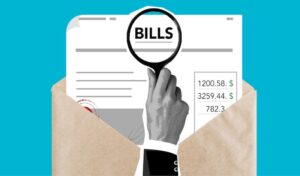What to Do About Debt Collectors

“This post may contain affiliate links. If you use these links to buy something we may earn a commission but you may gain some knowledge.”
Paying off debt is no easy task. It will take time, patience, frugal living and careful budgeting. As if it wasn’t hard enough, the added stress when the debt collectors start calling makes it worse. This article will help you understand what they can and can’t do and how to handle it.
In most cases the person that keeps calling you doesn’t even work for the organization that they are trying to collect for. Most outstanding debts are sold to a third-party collector. The Fair Debt Collection Practices Act has put rules in place the clearly state what powers these companies have.
Of course, many of these companies don’t follow these rules and the Consumer Financial Protection Bureau reported over 200,000 complaints about the actions of these companies in 2013.
How to Handle Unwanted Phone Calls
If you are being contacted by a debt collector there are a few things you can do to protect yourself. When a debt collector calls your workplace or at a time the doesn’t work for you to talk all you have to do is ask that they don’t call you there or at that time again and they are obligated to honor that request.
You also have the ability to tell the collection representative to stop contacting you completely. The Federal Trade Commission has advised that you do this in writing and pay for a return receipt so that you know the letter was delivered. Make sure to keep a copy of the letter.
This however does not remove the debt and it will be up to you at this point to settle the debt with the original creditor. By taking this action it could show the collection agent that you are unwilling to work with their company and they may take legal action against you to resolve the debt.
If you have an attorney that is representing you to resolve the debt, they should be the only person that the debt collector should be contacting for this matter.
Resolving the Debt
If you are contacted to resolve a debt, there are a few things you need and have a right to know:
- Where was the debt originated?
- How much is it
- How to verify the debt is yours
- How to dispute the debt if you don’t think it’s accurate
If you ask these questions the collector is required to provide you with this information as soon as possible. By law, they are required to provide you these answers in writing within five days. They are also not allowed to contact you about the debt again until they have provided this information.
If your intention is to dispute the debt, you need to do so within thirty days of receiving the instructions of how to do so. Once you begin the process of disputing the debt, the collection agency should not call you until the process is resolved.
It is illegal for debt collectors to misrepresent or lie about the money you owe, or claim that you have committed a crime. They also cannot state weather a form is legal it they aren’t, or that they are if they are not.
It is always a good idea to make note of conversations that you have with the debt collector, specifically date and times and details about the conversation. I would also suggest asking if the conversation is being recorded and make note of it so that you could use it for your legal defense if matters come to that.
Don’t Let the Harassment Continue
If you know that a collector is harassing you or breaking the law, don’t allow it to continue. It is advised that you document the instance of them breaking the law as soon as possible. Include the date, a record of the violation and record anybody that was there in case you need a witness. From this moment on, only speak with the creditor with another person.
Your next step is to file a complaint with the Federal Trade Commission (FTC). When you do this, make sure to include the name of the individual you spoke with, the name of the company and its address, the date and time the conversation took place, and the name of any witnesses.
If there is any physical evidence of a violation, such as mail or a voice recording, make sure to include copies these in your complaint as well.
A similar complaint should be filed with the agency that oversees collection agencies in your state and you should provide them all of the same materials. It would also be wise to send copies of all the same material to the collection agency as well as the original creditor. Nolo.com stated that the original creditor may end up canceling the debt because of their part in leading to the violation.
Summary
Paying off your debt can be hard work, especially when there is a lot of it. A collection agency that doesn’t abide by the rules can make the endeavor even more stressful so it is important to know what your right are and how to protect them.
The best course of action is to work with the original creditor before it gets to the point of being sent to a collection agency. In most cases your creditor will work with you in the event that you can’t pay right now. They will work out a plan with you as long as you communicate with them and stick to the plan.
The worst thing you can do is not communicate with your creditor, if you don’t communicate with them then they have no choice but to send the debt to a collection agency. If this happens and the agency does not follow the rule of law then it is important to remember your rights.
Be sure to let the collection agent know when it is OK to contact you, make note of the details of your conversations, if the agency is violating the law, don’t allow it to continue. File a complaint with the FTC and your local state agency detailing as much as you can about the violation.
In most cases you are not going to run into these issues, but if they do it is important to know what to do and your best course of action is to always not let your debts get to this level.



